These interviews were conducted in 2020 via Zoom, in the midst of the Covid-19 pandemic. The women selected to represent activism within the feminist movement in Perú were identified by Diana Miloslavich Túpac, the Director of Flora Tristán – one of the most prominent women’s organizations in Perú. The women interviewed reflect the multicultural and intersectional approach to gender equity in Perú that places value on difference. The interviewees have diverse backgrounds that reflect the complex identities and positions included in the feminist movement: indigenous leaders, scholars, congresswomen, directors of key feminist organizations, obstetricians, scholars, trans activists, and youth leaders. The women ranged in age from early 30s to their 70s at the time of the interview.
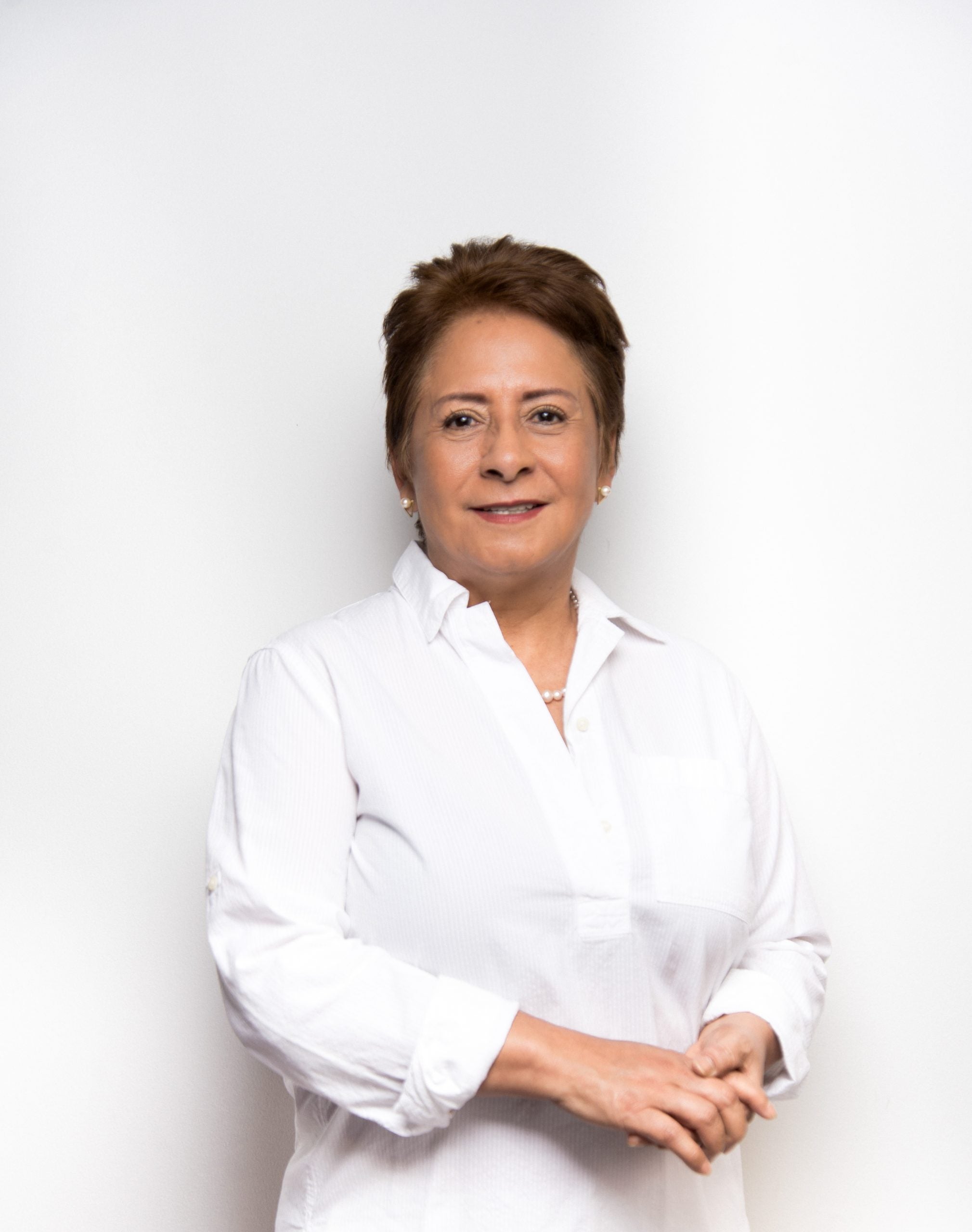
Susana Chavez Alvarado
Susana Chavez Alvarado, born in 1959, has a master’s in Public Health from Cayetano Heredia University. She is an obstetrician graduated from the National University of San Marcos and a specialist in sexual and reproductive health public policy. Susana is a founder, member, President, and Executive director of Promsex, a non-profit organization with a focus on sexual and reproductive rights that reflects a dignity, justice, and equity approach. She is also an executive secretary of the Latin American Consortium against Unsafe Abortion (Consorcio Latinoamericano contra el Aborto Inseguro, CLACAI). She has significant experience in the development of programming and scholarship around sexual and reproductive health and gendered violence. Along with her level of expertise in the field of sexual and reproductive health, Chavez has a particular interest in helping adolescent and child mothers navigate pregnancy. Her work with these adolescent and child mothers includes advocating for abortion rights. Susana is a widely published scholar in the field of Women and Politics Research, Human Rights, and Health Policymaking, collaborating with other researchers in various studies. She has authored, co-authored, and edited several books, including Life Histories of Women Who Experienced An Abortion Because Of Sexual Violence (2015), Stories To Avoid Forgetting: Violence In Relation To Adolescents’ Maternal Mortality, a qualitative study in Peru 2012-2014 (2015), Border spaces: Encounters between social services and health needs of women in La Pampa (2017), and Perceptions About Sexual And Reproductive Rights In Adolescents (2007), among others. Susana has published several studies in academic journals. She has also been an instructor of Health Public Policy with the Institute for Citizenship and Democracy (Instituto Ciudadanía y Democracia).
Keywords: community activism, reproductive rights
Media: Transcript (Spanish, English), Video, YouTube Video (Spanish, English Subtitles), Name Pronunciation Audio
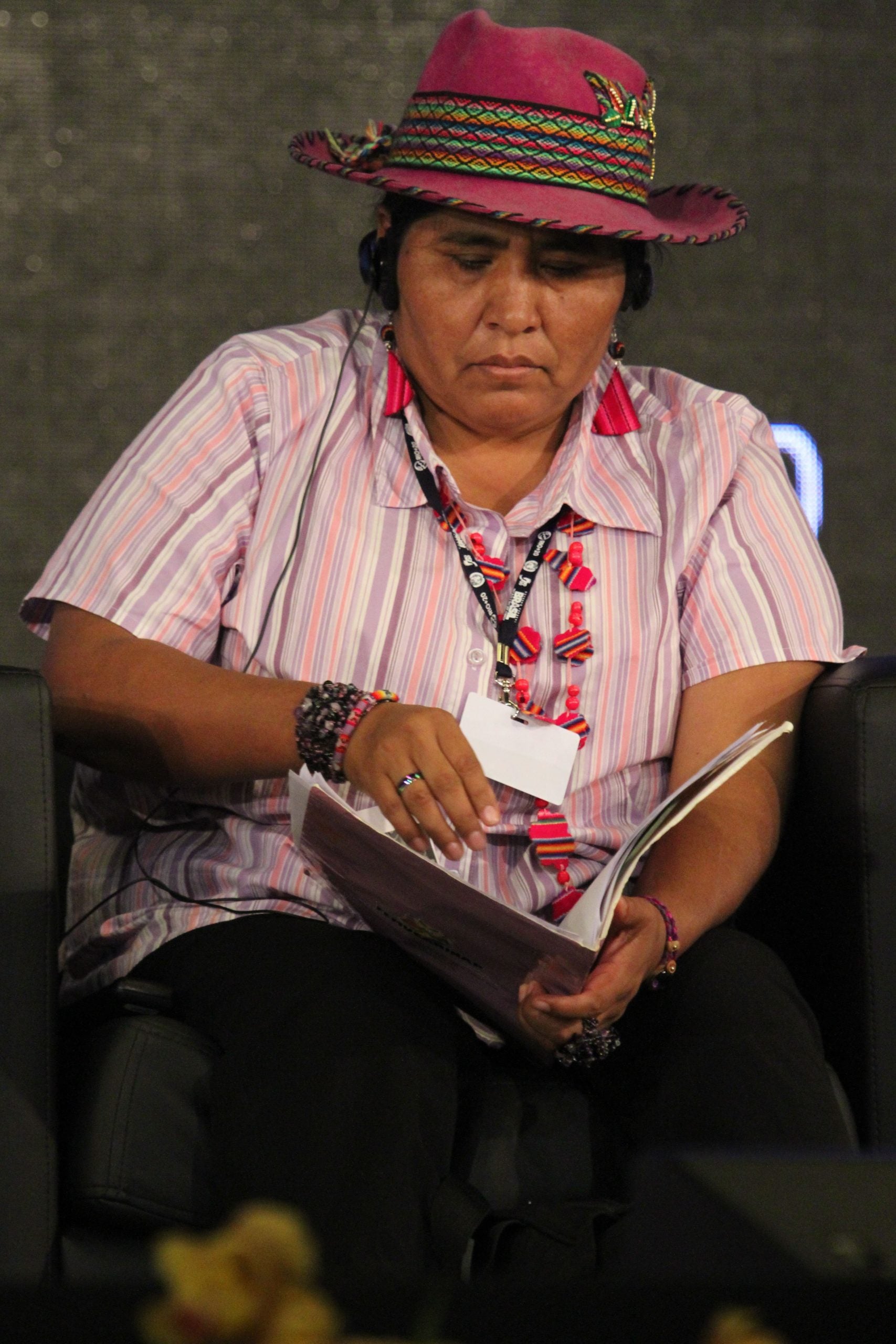
Lourdes Huanca Atencio
Lourdes Huanca Atencio, born in 1968, is founder and president of the National Federation of Female Peasants, Artisans, Indigenous, Native and Salaried Workers of Peru (FENMUCARINAP). The organization was founded in 2006 with the purpose of defending and fighting for the rights of women in Perú. Rooted in an ancestral cosmovisión (or worldview) of their indigenous communities, a central struggle has been the fight for their subsistence, in maintaining land, water and seed sovereignty. The main goals include: (1) control and defense of the territory of the female body, which is often violated; (2) the political, economic, social and cultural empowerment of women who sustain society, yet whose work and contributions are not recognized; (3) defending the sovereignty of indigenous women’s subsistence, which is land, water and seeds, because a campesina (or rural woman) without those things has no choice but to move to city where she then becomes extremely impoverished. Lourdes is one of five women promoters of human rights who were recognized by the Ministry of Justice and Human Rights in Perú during a ceremony held in the framework of the commemoration of International Women's Day in March 2020. She has also participated in numerous UN initiatives (e.g., as a regular participant in the United Nations Framework Convention on Climate Change) and is also a member of the Fund for the Development of Indigenous People of Latin America and the Caribbean (FILAC).
Keywords: community activism, rural women and land reform
Media: Transcript (Spanish, English), Video, YouTube Video (Spanish, English Subtitles) Name Pronunciation Audio
Interviewee Photo Credit
By theverb.org. https://www.flickr.com/photos/71015487@N03/7382740578/in/photolist-cfotyE. Creative Commons. Accessed 2 February, 2021.

Indira Huilca Flores
Indira Huilca Flores, born in 1988, is a sociologist and progressive feminist activist. She received her degree in Sociology from the Universidad Nacional Mayor de San Marcos, in Lima, and studied for a Master's in Political Science and Government at the Pontifical Catholic University of Peru. In 2013 she was elected councilor of the Metropolitan Municipality of Lima, where she joined the Commissions for Urban Development, Environment, Women and Neighborhood Participation. In this capacity, she promoted the creation of the Women's Management as the body responsible for public policies on gender equality in Metropolitan Lima. She was elected to Congress in 2016 and her work had three priorities: gender, diversity and human rights; labor rights and unionization; and the right to the city and public spaces. As a Congresswoman, she was the President of the Committee on Women and Family and a member of the Committee on Labor and Social Security in which she worked for the rights of women, workers, and the LGTBI community. She was also outspoken in calling the first congressional plenary session on women held in May 2018. In 2017 she joined the new political party New Peru and was the elected official spokesperson for the period 2019-2020. In 2019, she resigned from the New Peru Movement after the dissolution of Congress led to the movement to support electoral alliances in the congressional elections of January 2020.
Keywords: politics and the law
Media: Transcript (Spanish, English), Video, YouTube Video (Spanish, English Subtitles), Name Pronunciation Audio

Diana Miloslavich Túpac
Diana Miloslavich Túpac was born in Huancayo, likely in the late 1950s or early 1960s. Diana is the Director of one of the most important women’s organizations in Perú, an expert on advancing women’s policy, and an accomplished author with more than 40 years of experience working to advance women’s political participation and human rights in Perú. She obtained a Masters in Literature at the Universidad Nacional Mayor de San Marcos and was a Ph.D. Candidate in Social Sciences, specializing in History with the thesis "History of the Political Participation of Women in Perú." Diana has participated in the execution of numerous projects in the promotion of legal and political initiatives related to women’s rights. For example, as part of the Women's Forum in Perú, she presented the first proposals for gender quotas and domestic violence in 1991. She was an advisor to the Women's Commission of the Municipality of Lima and of the creation of the Pro Equity Office from 1999 to 2002. In 2003, she was part of the team with the Ministry of Women and Social Development. In 2011, she was part of the Transfer Commission of the new government, and later Head of the Cabinet of Advisers to the Minister for Women. Diana has also participated in various projects with organizations such as: Equality Now, DAWN, RENAMA, Social Watch, UN Women, UNIFEM, UNFPA, UNICEF, DIAKONIA, CUSO, NOVIB, Oxfam, UE, and USAID, among others. Most recently, she was a major player in the campaign to promote and pass the newly established Gender Parity Law (Law No. 31030, 2020. Diana is currently the Director of the Political Participation and Decentralization Program of the Peruvian Women's Center, Flora Tristán, a key feminist institution created in 1979 with a focus on women’s rights. She is also an accomplished author (select titles): The Autobiography of Maria Elena Moyano: The Life And Death Of A Peruvian (1992), with editions in Spain and translated in Italy, USA and Japan); Women's Literature, A look from feminism (2012); Flora Tristan: Peregrinations of an Outcast at the Fair (2019); Feminism and Suffrage 1933-1956 (2015); Political Harassment in Peru: A look at Electoral Processes (2016), Gender, Parity and Disaster Risk Management (2019), publishing both through Flora Tristán and an academic press in the U.S.
Keywords: community activism, politics and the law
Media: Transcript (Spanish, English), Video, YouTube Video (Spanish, English Subtitles), Name Pronunciation Audio
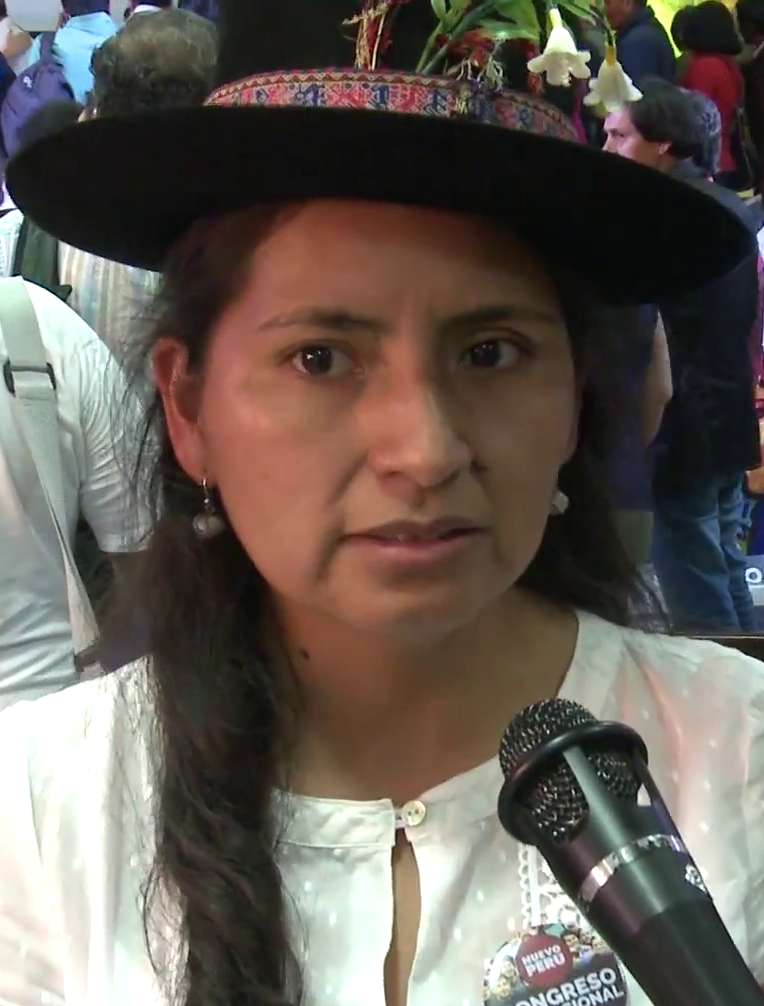
Tania Pariona Tarqui
Tania Pariona Tarqui, born in 1984, is an indigenous activist, Quechua leader, feminist, politician, human rights activist and former Congressperson. As an activist, she works to establish social equality for indigenous youth and women. She began her community work with National Movement of Organized Working Children and Adolescents of Peru (MNNATSOP), an overarching umbrella for many children’s working groups. She was chosen as a Latin American delegate and had her first experience of international representation at age 15 at the “World Summit for Children” at the United Nations in New York. She studied Social Work at the San Cristóbal of Huamanga University, graduating in 2009, and then Human Development at the Pontifical Catholic University of Peru in Lima. She went on to work with the Centre for Indigenous Cultures of Peru (CHRIAPAQ), collaborating on several projects aimed at indigenous youth and women nationally and internationally. In 2010, with Andean and Amazonian sisters, she helped form the Organización Nacional de Mujeres Andinas y Amazónicas de Perú, (ONAMIAP) that promotes the participation of indigenous women and fulfillment of their individual and collective rights. She was the first youth secretary for ONAMIAP. She was elected to the Peruvian Congress in 2016 by the Broad Front for Justice, Life and Freedom, coalition of political parties. In September 2017, she joined the New Peru movement. From 2018-2019, she was the president of the Commission on Women and Family, which promoted the first thematic plenary session focused on a women’s agenda and equality between men and women. Her parliamentary work was dedicated to the defense of the rights of indigenous and native peoples against mining companies, the human right to water and reparations for the victims of the armed conflict, and working against impunity of the perpetrators of crimes, including compulsory sterilization under Alberto Fujimori's government. She is currently assuming responsibility for the Indigenous Women’s Program in CHIRAPAQ and has concerns for the indigenous populations of the Sierra and jungle coast, in the face of the COVID-19 pandemic.
Keywords: community activism, gender-based violence, indigenous issues, reproductive rights, rural women and land reform
Media: Transcript (Spanish, English), Video, YouTube Video (Spanish, English Subtitles), Name Pronunciation Audio
Interviewee Photo Credit
By psperu. https://commons.wikimedia.org/wiki/File:Tania_Pariona_Tarqui.png. Creative Commons. Accessed 2 February, 2021.
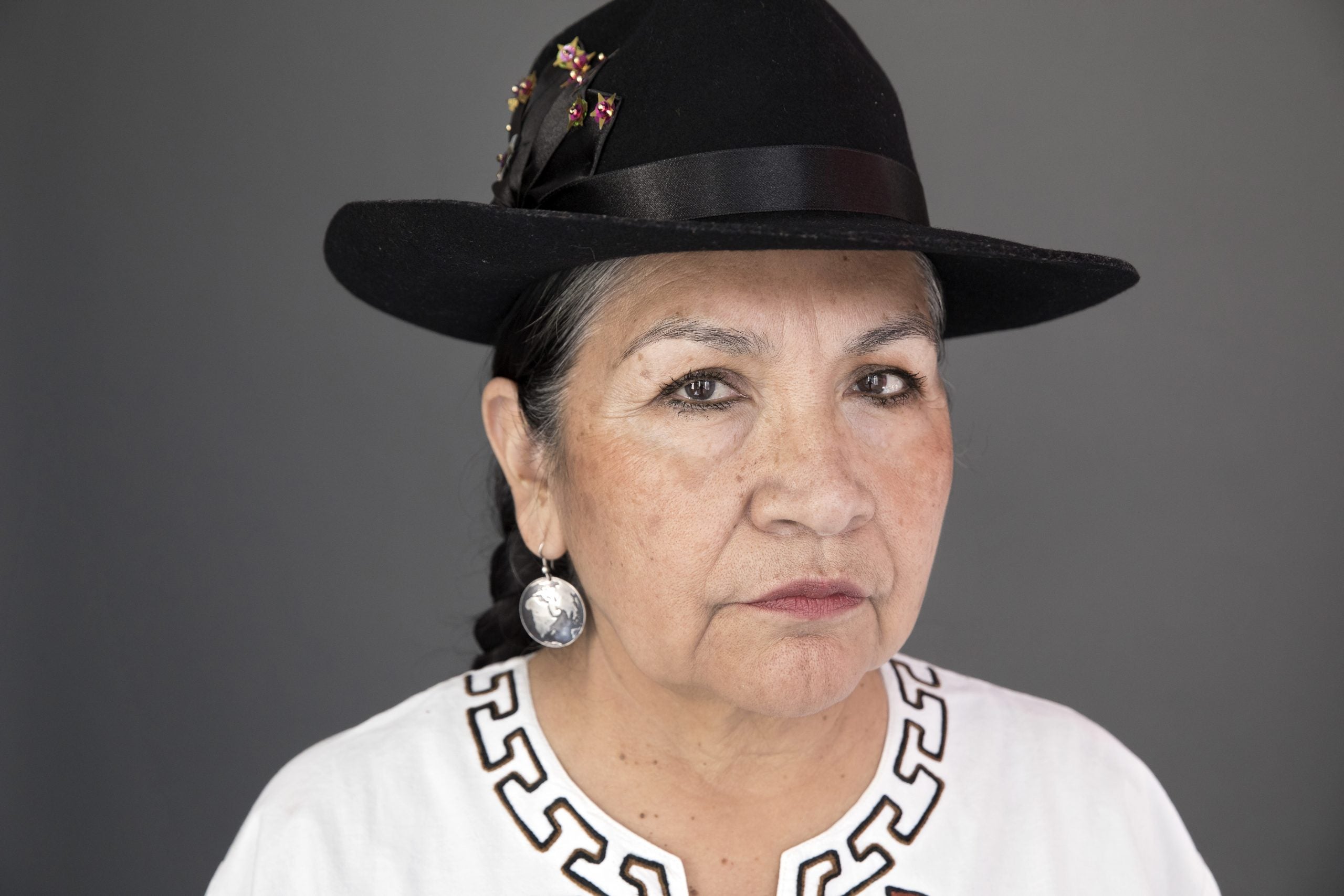
Tarcila Rivera Zea
Tarcila Rivera Zea is a Quechua activist who has dedicated nearly 40 years of her life to defending and seeking recognition for the indigenous people of Perú. She was born in the community of San Francisco de Pujas, Ayacucho, capital of the province of Huamanga, Peru. During the 1970s, she worked as a specialized secretary in archival and library science at the Ministry of Culture of Peru, studying at the Vatican City and Argentina. She also served as secretary of Martha Hildebrandt at the National Institute of Culture. Years later she collaborated as a journalist for the Pueblo Indio magazine of the Indian Council of South America (CISA). In recognition of her work in collecting testimonies of Indigenous women raped during armed conflicts, she was invited to pursue specialization courses in human rights at the Institute for Social Studies (ISS) in The Hague, The Netherlands, and the International Center for Education in Human Rights in Charlottetown, Canada. In 1987 she began to participate in international processes on the rights of indigenous peoples, as well as in United Nations conferences on Women, which led her to be invited by UN Women in 2012 to be part of her International Advisory Group on the Civil Society. Rivera Zea is the founder of the Continental Link of Indigenous Women of the Americas (ECMIA) and the International Forum of Indigenous Women (FIMI), two networks that promote the empowerment and political involvement of the world's indigenous women. As a result of all her years of activism, defending and making visible the cultures and indigenous peoples of Peru, the Permanent Workshop of Andean and Amazonian Indigenous Women of Peru and of the Center of Indigenous Cultures of Peru (CHIRAPAQ) was created. She was president of CHIRAPAQ and is currently the vice president, coordinator of the Continental Liaison for Indigenous Women of the Americas (ECMIA), member of the Board of Directors of the Voluntary Fund for Indigenous Peoples of the United Nations between 2006 and 2011. She has also collaborated in the creation of the International Indigenous Press Agency (AIPIN).
Keywords: community activism, intersectionality, racial identity, rural women and land reform
Media: Transcript (Spanish, English), Video, YouTube Video (Spanish, English Subtitles), Name Pronunciation Audio
Interviewee Photo Credit
By UN Women. https://www.flickr.com/photos/unwomen/32865257584/in/photolist-S5c359-24bQkzG-z18VSS-24bQkyu. Creative Commons. Accessed 2 February, 2021.
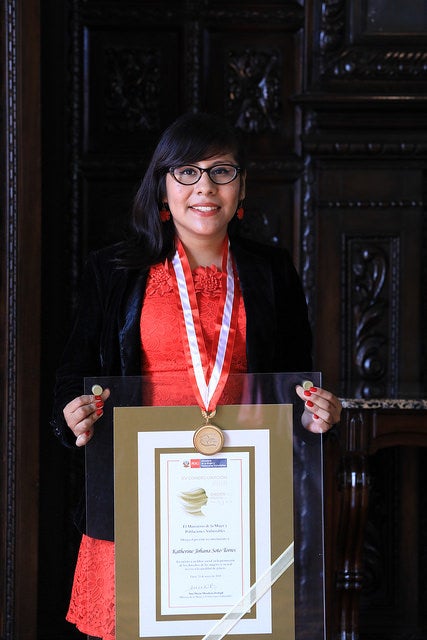
Katherine Soto Torres
Katherine Soto Torres, born in 1993, studied Sociology at the Universidad Nacional Federico Villarreal and is currently completing a Master's in Public Policy at the Universidad Católica-Peru. She is the daughter of migrants and the first in her family to have access to a college education. Kate is a young activist, recognized by the Ministry of Women and Vulnerable Populations for her work with Carabayllo youth through her club of girls SULANS (Siempre Unidas Lograremos Alcanzar Nuestros Sueños; United Always We Will Reach our Dreams), which works to create safe and empowering spaces for young girls. Among other awards, Katherine received the “Order of Merit for Women” from Peruvian President Martin Vizcarra in 2018, in recognition of her social work in the promotion of women's rights and the fight for gender equality. Kate founded Mujeres Desaparecidos Perú (Missing Women-Peru), an organization that reports cases of missing women and girls and was born out of the disappearance of her friend Solsiret Rodríguez, who is still unaccounted for. Kate is also the coordinator of the CHIRAPAQ, a Centro de Culturas Indígenas del Perú project that promotes the affirmation of identity and the recognition of indigenous rights in the exercise of citizenship, with a special commitment to indigenous children, youth and women.
Keywords: activism during the COVID-19 pandemic, community activism, sex work
Media: Transcript (Spanish, English), Video, YouTube Video (Spanish, English Subtitles), Name Pronunciation Audio
Interviewee Photo Credit
By SouhiroZ. https://commons.wikimedia.org/wiki/File:Katherine_Johana_Soto_Torres.jpg. Creative Commons. Accessed 2 February, 2021.
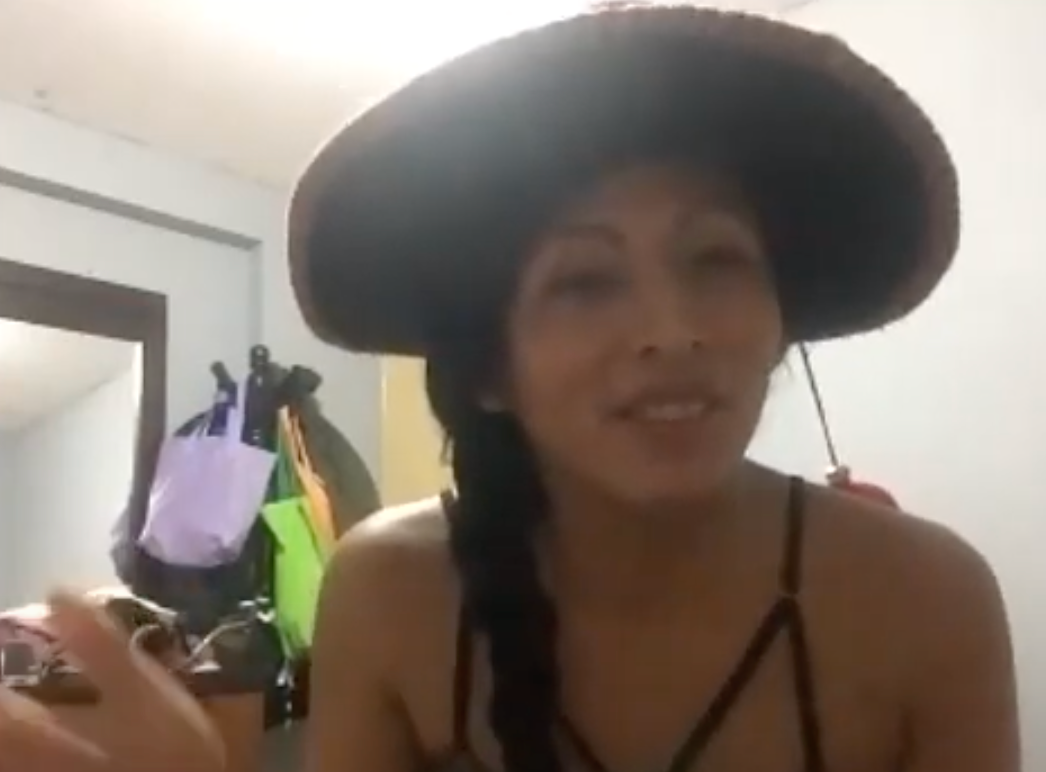
Gahela Tseneg Cari Contreras
Gahela Tseneg Cari Contreras, born in the early 1990s, is a transgender woman who began participating in politics in 2015 in the National Youth Congress held in Huaraz. Gahela grew up in a rural area of the Ica region. Her early life reflects much of the upheaval of Peru's recent history. Her mother was a peasant leader, native of Ayacucho, who was saved from forced sterilization ordered by the government of Alberto Fujimori. Her father was forced to flee Peru because of threats from terrorists, who besieged the work of union leaders. Both became immigrants, as did another 7 million Peruvians who mobilized internally for political or economic reasons. At age 27 she ran to become the first transgender woman in Peru’s Congress in the January 2020 elections, campaigning with what has been described as one of the most courageous and intersectional programs of the emerging and diverse Peruvian left. Although she did not win a seat, she has continued her political activism to transform issues of equity and discrimination among LGBTI individuals.
Keywords: community activism, LGBTQ+ rights, politics and the law
Media: Transcript (Spanish, English), Video, YouTube Video (Spanish, English Subtitles), Name Pronunciation Audio
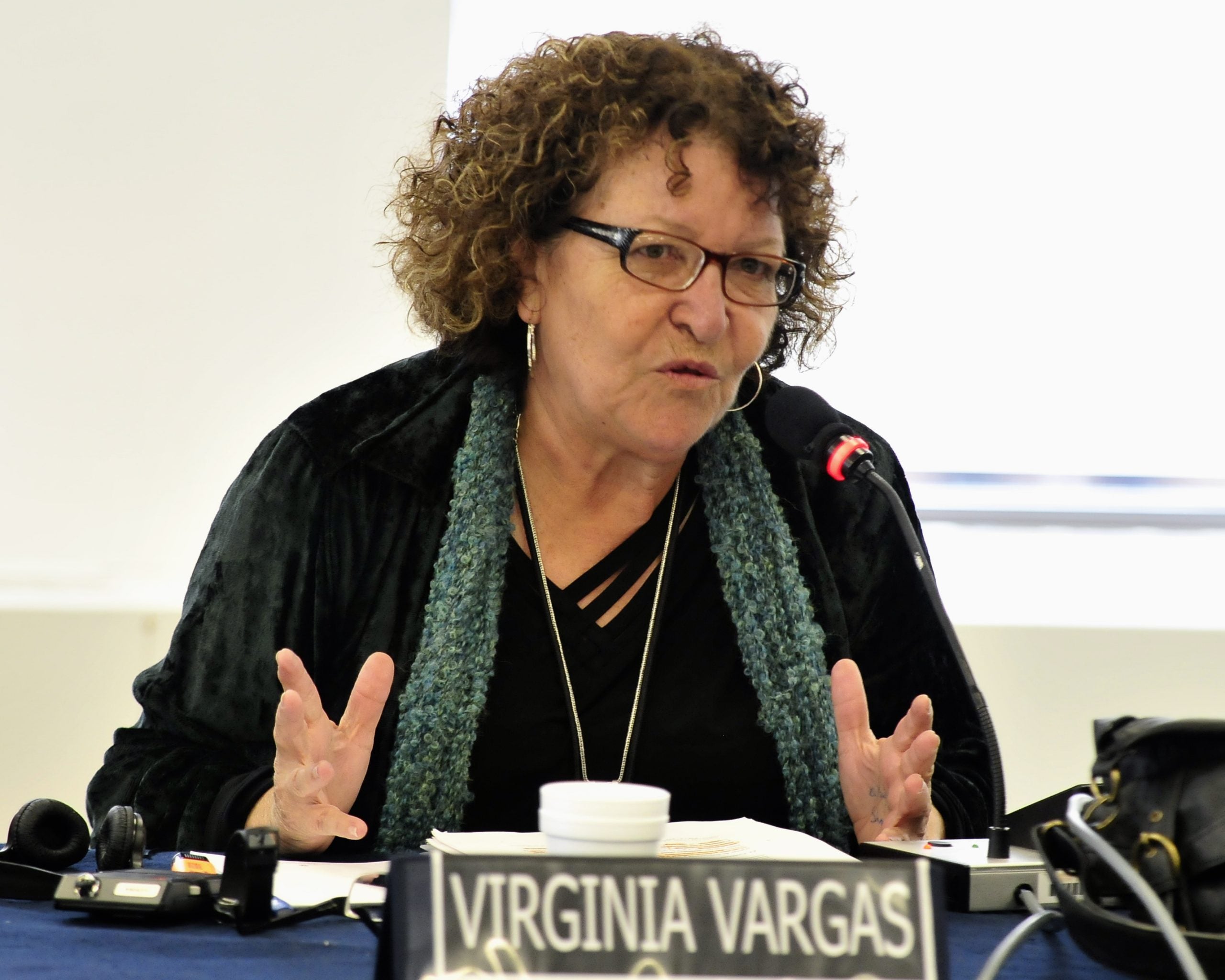
Virginia Vargas
Virginia Vargas, born in 1945, is sociologist and a leader of the women's movement in Peru. In 1978 Vargas was a founding member of the Flora Tristán Center, a non-governmental Peruvian organization that studies, educates, and lobbies for women's rights. She served as the organization's coordinator and later its director until 1990. She founded the Latin American division of DAWN (Development Alternatives with Women for a New Era). She has long been engaged in the struggle for democracy and was candidate for Congress in 1985 and one of the leading activists in coordinating the organization Women for Democracy (MUDE) in 1997. Vargas was the recipient of a UNIFEM Award during the United Nations' 4th World Conference on Women in Beijing in September 1995. In 2000 she spoke at the UN General Assembly in New York on behalf of Latin American and Caribbean women’s NGOs. Beginning in 2001, Vargas became part of the World Social Forum's International Committee. She is also on the Advisory Council of the National University of San Marcos' Institute for Democracy and Global Transformation. In 2005, at the Millennium Social Summit, she was a speaker representing Civil Society at the UN General Assembly, New York. Vargas has participated in debates and discussions in many countries being internationally recognized as an activist and academic/researcher and is the author of over 40 publications on citizenship, the state, and democracy from a feminist perspective.
Keywords: academia and women's studies, feminist conferences, intersectionality
Media: Transcript (Spanish, English), Video, YouTube Video (Spanish, English Subtitles), Name Pronunciation Audio
Interviewee Photo Credit



